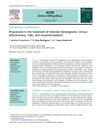 49 citations,
September 2012 in “The Journal of clinical endocrinology and metabolism/Journal of clinical endocrinology & metabolism”
49 citations,
September 2012 in “The Journal of clinical endocrinology and metabolism/Journal of clinical endocrinology & metabolism” The document concludes with guidance for doctors on diagnosing and treating hirsutism effectively and safely.
 45 citations,
December 2018 in “Lasers in Medical Science”
45 citations,
December 2018 in “Lasers in Medical Science” LLLT promotes hair growth and improves hair density safely in men and women.
 42 citations,
February 1985 in “Journal of the American Academy of Dermatology”
42 citations,
February 1985 in “Journal of the American Academy of Dermatology” Excessive hair growth can be assessed by history, exam, and blood tests, and treated with medication like dexamethasone, birth control pills, and spironolactone.
 41 citations,
April 2010 in “Gender Medicine”
41 citations,
April 2010 in “Gender Medicine” The conclusion is that hirsutism should be diagnosed and treated because it affects quality of life and may signal other health problems.
 31 citations,
June 2015 in “British Journal of Dermatology”
31 citations,
June 2015 in “British Journal of Dermatology” Hormonal treatments are effective as a second-line option for moderate-to-severe acne in females, but should be used with caution due to health risks.
 30 citations,
February 2018 in “Journal of Pharmacy and Pharmacology”
30 citations,
February 2018 in “Journal of Pharmacy and Pharmacology” Hedychium spicatum has medicinal properties but needs more research for scientific validation and use.
 26 citations,
March 2014 in “Arquivos Brasileiros De Endocrinologia E Metabologia”
26 citations,
March 2014 in “Arquivos Brasileiros De Endocrinologia E Metabologia” The document concludes that proper diagnosis and combined treatments are key for hirsutism management, and weight loss may help overweight patients.
 16 citations,
September 2018 in “Journal of Molecular Liquids”
16 citations,
September 2018 in “Journal of Molecular Liquids” The PS-b-PAA copolymer nanomicelles are effective for delivering a cancer treatment drug in photodynamic therapy.
 16 citations,
December 2011 in “Actas Dermo-Sifiliográficas”
16 citations,
December 2011 in “Actas Dermo-Sifiliográficas” Propranolol is effective and safe for treating infantile hemangioma, but more research is needed for dosing and monitoring guidelines.
 11 citations,
April 2017 in “The European Journal of Contraception & Reproductive Health Care”
11 citations,
April 2017 in “The European Journal of Contraception & Reproductive Health Care” Cyproterone acetate with ethinyl estradiol is effective for treating skin symptoms related to high androgen levels, like in PCOS.
 7 citations,
April 2021 in “Dermatology and Therapy”
7 citations,
April 2021 in “Dermatology and Therapy” H-1 antihistamines may help with various skin conditions, but more research is needed to confirm their effectiveness.
 May 2019 in “Paediatrics and child health”
May 2019 in “Paediatrics and child health” The document concludes that personalized treatment, including lifestyle changes and medication, is essential for managing PCOS in teenagers, while also addressing their psychological well-being.
 1 citations,
August 2024 in “Pharmaceuticals”
1 citations,
August 2024 in “Pharmaceuticals” Goat placenta extract in a special delivery system improved hair growth and thickness in chemotherapy patients.
 1 citations,
March 2023 in “Nutrients”
1 citations,
March 2023 in “Nutrients” The conclusion is that obesity should be managed with a slow, balanced approach to diet and exercise, with medication and surgery as additional options, and education and access to care are important.
 December 2023 in “Trials”
December 2023 in “Trials” The trial is testing if a helmet that uses light can prevent hair loss during chemotherapy.
 July 2023 in “International Journal of Endocrinology”
July 2023 in “International Journal of Endocrinology” Centratherum anthelminticum seed extract effectively treats Polycystic Ovary Syndrome in rats.
 2 citations,
February 2022 in “Frontiers in Endocrinology”
2 citations,
February 2022 in “Frontiers in Endocrinology” Antiandrogenic pretreatment for women with PCOS does not improve fertility outcomes and delays pregnancy.
 1 citations,
December 2023 in “Indian Dermatology Online Journal”
1 citations,
December 2023 in “Indian Dermatology Online Journal” Steatocystoma multiplex causes recurring skin cysts and needs early recognition for better management.
21 citations,
April 2021 in “ACS omega” Curcumin can be effectively loaded into polystyrene nanoparticles, which are safe for human cells and more biocompatible with curcumin inside.
 14 citations,
May 2022 in “Asian Journal of Pharmaceutical Sciences”
14 citations,
May 2022 in “Asian Journal of Pharmaceutical Sciences” New hair follicle-targeting treatments show promise for hair disorders but need more research on safety and effectiveness.
November 2023 in “Biology” N6-methyladenosine affects hair follicle development differently in Rex and Hycole rabbits.
27 citations,
January 2018 in “Drug Delivery” GC10/DOX hydrogel shows promise as an effective thyroid cancer treatment.
 9 citations,
March 2023 in “Biomimetics”
9 citations,
March 2023 in “Biomimetics” New materials that better mimic natural skin structure could improve healing, especially for chronic wounds.
 11 citations,
September 1997 in “Archives of Dermatology”
11 citations,
September 1997 in “Archives of Dermatology” Reduced androgens linked to kinky hair disorder and hair loss; 5a-reductase inhibitors may help.
 June 2024 in “Reviews on Recent Clinical Trials”
June 2024 in “Reviews on Recent Clinical Trials” Finasteride and dutasteride may cause metabolic issues like liver disease and diabetes.

Nepenthes kampotiana extract can potentially prevent hair loss and could be an effective treatment for common baldness.
 November 2022 in “Journal of Investigative Dermatology”
November 2022 in “Journal of Investigative Dermatology” The lotion with specific plant extracts effectively increased hair growth and improved hair cycle in subjects after 3 months.
January 2010 in “Research and Practice on Chinese Medicines” Coffee extract and caffeotannic acid can help treat hair loss.
 29 citations,
January 1996 in “Journal of Pharmaceutical Sciences”
29 citations,
January 1996 in “Journal of Pharmaceutical Sciences” Finasteride poorly inhibits type 1 5AR, affecting its effectiveness.
 May 2018 in “Más dermatología”
May 2018 in “Más dermatología” The higher dose supplement was more effective in treating female hair loss.


























